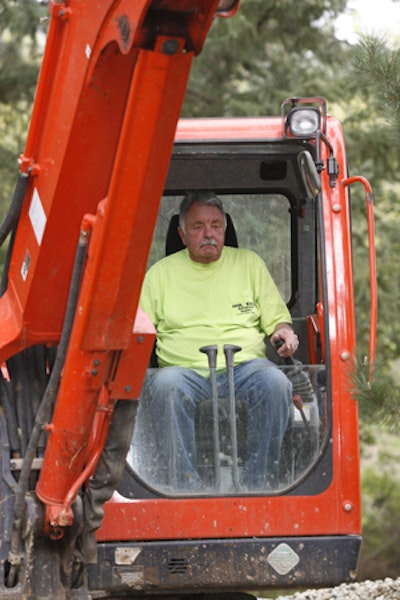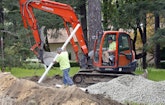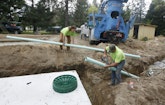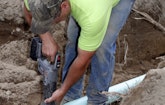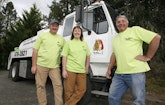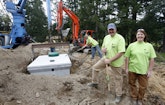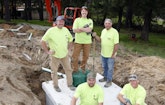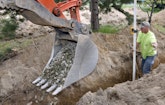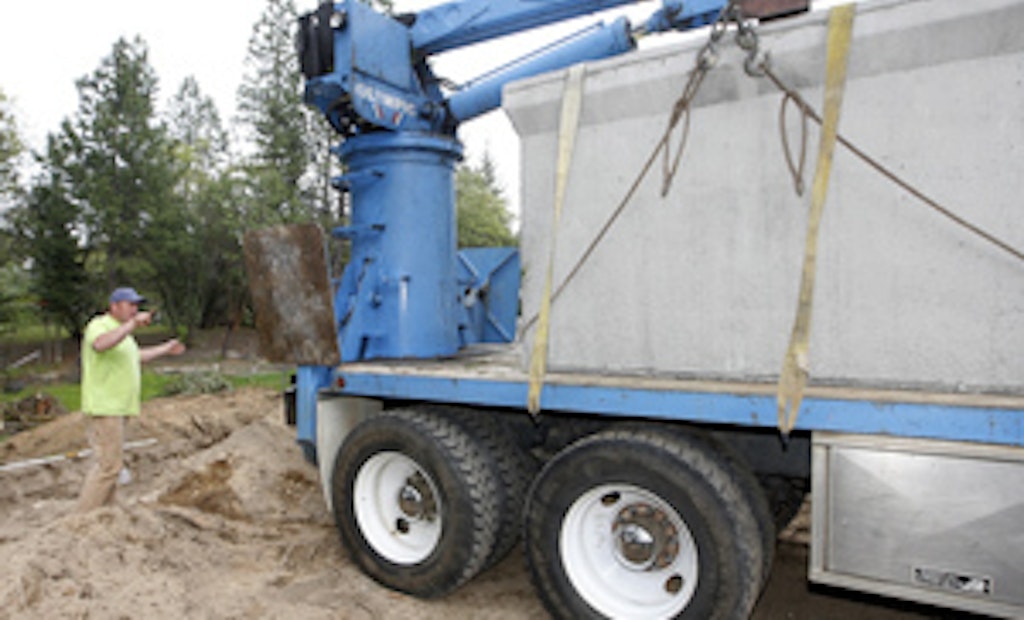Les Harris looks for opportunity – he doesn’t wait for it to come knocking. That’s the way he has done business for 35 years, and it’s an attitude that has kept his company alive. In fact, when the recent recession took hold of the nation’s economy, Harris’ way of thinking not only saved his business – it made it thrive.
“Tough economic times can be a good thing or a bad thing,” says Harris, co-owner of Mr. Ed’s Advanced Septic, LLC in Grants Pass, Ore. “It just depends on how you look at it. When things were really looking bleak and I didn’t know if we were going to make it, I decided to expand the business.
“I bought a pumper truck. It was a risky move. When conventional wisdom tells you to tighten your belt, spending money doesn’t usually make much sense. But it was a risk that paid off.” It paid off in a big way: He now does more business than he ever did, even before the economic downturn. Overall growth is about 20 percent and rising.
The business mix now consists of about 70 percent installation and 30 percent service, including repair. “You never know what’s going to work,” Harris says. “Staying in front of the economy is a big problem these days. The pumper truck has brought in a lot of business that we wouldn’t have had.”
It also brought in some business that Harris wasn’t expecting – repair work to supplement his installation business. “We don’t offer operation and maintenance, only because in Oregon you must be licensed,” says wife and co-owner Stacy Harris. “But we service our customers up until it requires a licensed O&M contractor.”
Building business
About 40 percent of calls to Mr. Ed’s are for maintenance checks, and sometimes an employee finds something wrong, such as a failed pump or a cracked tank. In those cases, the company recommends the appropriate repair.
Most of the time, people already know they have a problem when they call for service. “A homeowner might call saying that there’s effluent surfacing somewhere around the tank or in the drainfield,” Harris says. “When we get there, we diagnose it. Sometimes, though, the problem isn’t obvious.” In those cases, his years of experience lead him to the answer.
“Just because the tank is backed up doesn’t mean there’s anything wrong with it,” he says. “The real problem could be further down the line, like in the drainfield. You just have to take your time to analyze the situation and not jump to conclusions. You do one bad service call, and you lose 20 customers because that one customer will tell everyone they know. Word of mouth is very important in this business.”
Harris believes good customer service is paramount in keeping and building business: “When people come home and they can’t get the toilet to flush, we’re there to help them. Staying in business means keeping customers happy – it’s taking calls on weekends and Christmas Eve. People say that I am a workaholic, but hard work is what keeps the company going.”
Buying used
Getting into the pumping side added to the workload. The company’s vacuum truck is a 1990 Mitsubishi Fuso HD-FX with a 2,000-gallon Leland tank and a Masport pump. “We decided to buy a used pumper truck because we didn’t want a payment – especially since we didn’t know if the risk was going to pay off,” says Harris. “With a used truck, of course, the up-front equipment price was lower right from the start.”
Harris also purchased a 1992 10-cubic-yard Ford dump truck to complement the company’s other equipment, which includes:
Freightliner ramp truck
410 E John Deere backhoe
Two Kubota steel trackhoes
B-6 Yanmar steel trackhoe
Dodge 2500 pickup truck
GMC utility truck
The newly purchased equipment and increased business have breathed new life into Mr. Ed’s, but it is in no way a new company. Mr. Ed’s had been around long before Harris bought it. The company gets its name from original owner Ed Ownbey.
“You could say he was my mentor,” says Harris. “I learned everything in business from him. If I have any questions, he guides me.” Now, with more than three decades of experience of his own, Harris profits from his own skill in onsite installation.
Soil challenges
“Being able to go onto a site that has problems and put in a system that works properly, and knowing the owner won’t have to worry about health issues, is one of the most satisfying parts of this job,” says Harris.
That takes an understanding of soil and site conditions. Oregon has nearly 1,000 kinds of soil, from deep to shallow, from clay to sand, with terrain from nearly level to steeply sloping. The company tries to use conventional stone and pipe where possible.
“The decision on what type of system to use really isn’t hard,” says Stacy Harris. “We have our preferences, and we try to make the best decision according to the soil types, accessibility and economics. We feel the best system in a clay area is good old rock and pipe. For steep slopes, we try to use rock and pipe, too, if it’s accessible for dump trucks. If not, we use EZflow media (Infiltrator Systems Inc.).”
Where site conditions call for advanced treatment units, they have deployed AdvanTex AX20-RT systems (Orenco Systems Inc.) and Whitewater DF-50 and DF-150 units (Delta Environmental Products).
“Oregon is one of the hardest states to get anything approved in,” says Harris. “Putting in a septic system in a rural county here is something you need to plan for. The price of rock and pipe makes it really hard. But the regulations usually dictate what you can and can’t do. Oregon is very regulated because the groundwater is one of the state’s biggest resources. But the rivers are protected, too.”
Being ready
Because job sites can be unpredictable, Harris believes installers need to be organized and set up their days accordingly. “It’s always a planning process going on in this business,” he says. “What are we doing each day? What products do we need?
“I can be on any job site at any time. Or I may be in the office writing up bills or doing other paperwork. I am where I am needed. If that means that I’m needed on the end of a shovel, that’s where I am for the day.”
Being prepared also means keeping up with new treatment technologies and techniques. For that, Harris relies on trade shows. “We’re required to earn continuing education credits,” he says. “A lot of the shows have classes where you earn those credits. All the classes I’ve been to have been well worth the money.”
Bringing that knowledge back to the business and the employees strengthens the company’s foundation and creates an organization that can easily move with the times. The Mr. Ed’s team, in addition to Ownbey, includes Mike Tracer, who has 10 years with the company, and Jasen Russell, just in his second year. Harris says that without Stacy, the business wouldn’t be the same.
Getting respect
“She works right out there with us,” says Harris. “She can drive the trucks. She doesn’t operate any equipment, but she will tote pipe up and down the hill and shovel whatever needs shoveling. She’s our main permit runner. I tell everybody she’s the person to go to for permitting.”
Stacy loves her job. “What I like best is learning just how technical flushing your toilet really is,” she says. “I like the challenges that every system has – never two the same. That, and I like working outside. I’m not much for doing office work, although I do that, too.”
Seeing a woman on the job in the onsite industry takes some people by surprise.
“The biggest challenge that I have to overcome is getting respect in a man’s industry,” says Stacy. But after 35 years in the business, she has made her mark. People no longer stare when they see her shoveling rock with other employees – she is part of the team.
Charity at home
The Mr. Ed’s team is not all about making a profit: The company does substantial charitable work. “We did some work for an elderly lady,” says Harris. “We donated a tank, and a friend donated the rock, and we got the system put in the ground. We didn’t make any money, but that wasn’t the important part. We’re serving our community.”
For people who may be short of money, there are always options. “We’ve had customers who pay us $25 a month until they get their bill paid off,” says Harris. “We try to do good-quality workmanship in any situation.”
Harris says that the charity work hasn’t affected his pricing, but the economy has caused him to make some changes.
“Three or four years ago, people would call and say, ‘Just come do it,’” he says. “But with the way the economy has been, we see a lot more people shopping for the better value. And that makes pricing tricky, because now a lot of our work comes through bids. We’ve been successful in securing bids because we stay consistent, considering the materials that we use, our equipment, labor costs and other factors.
“For the most part, we keep our pricing in the middle. If you price too high, people are suspicious. Too low, you can’t make any money.
“Our biggest advantage in this market is longevity. People know us. We get customers who say that Mr. Ed’s put in a septic system for their grandparents. And that might have been 40 years ago. Longevity is what keeps us alive. We lasted through the ‘80s when you couldn’t buy a job. It’s 2011. And we’re still here.”
